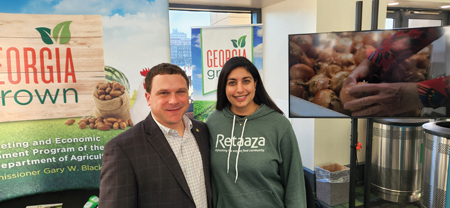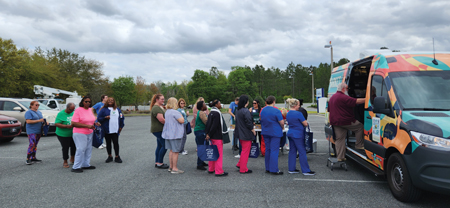Spotlight: Food Waste to Food Security

It is baffling how even in a bountiful country like the U.S., which has shocking amounts of food excess, there are still so many suffering from hunger. Atlanta-based social entrepreneur, Kashi Sehgal, has found a solution.
While serving on one of the subcommittees at Georgia Innovates Task Force, created by Lieutenant Governor Geoff Duncan, Kashi Sehgal saw two paradoxical realities that begged for a single, unifying solution. On the one hand, farmers in Georgia were having to throw away a massive amount of perfectly good produce that ended up rotting, and on the other, long lines of hungry folks at community food banks.
Surely someone must have addressed this glaring supply chain failure, thought Sehgal—especially because, at a staggering $75 billion, agriculture is the largest sector in Georgia’s economy. To her surprise, no such entity existed. So, Sehgal founded Retaaza, a for-profit social enterprise with the goal of connecting the surplus food of farmers to local consumers and families battling food insecurity, thereby making it more accessible and affordable to those who need it the most—a perfect marriage of commerce and social service.

Kashi Sehgal with Retaaza’s mobile market, which travels around neighborhoods in Georgia,
providing fresh food at affordable prices.
In the United States, around 102 billion pounds of food (approximately 40 percent of what’s produced) is thrown away by businesses and farms every year. In Georgia, two million pounds of annual food waste piles high in landfills even as one out of seven Georgians experiences food insecurity, one out of five being children.
Launched in 2020, Retaaza [a combination of English “re” (“again”) and Hindi “taaza” (“fresh”)], connects Georgia’s farming ecosystem with urban needs. “I like to think of us being like an air traffic control tower—a connector of resources across the local food industry. Ultimately, we buy good, nutritious, local food from farmers and provide a service to our clients, stakeholders, and those hungry and in need,” Sehgal said.

Retaaza is piloting a program with Grant Park farmers market to rescue food that is left over at the end of the market. Sehgal is seen here discussing the options with the vendors.
“With the increased cost of food, it is always a struggle for the impoverished to purchase wholesome, fresh vegetables. We were blessed with a large donation of fresh vegetables from Retaaza that we were able to pass on to our clients,” says Warren Hougland, Senior VP for Community Action Services, Osceola Council on Aging, a non-profit organization that is dedicated to providing services to enable independence and self-sufficiency for seniors, disabled adults, and disadvantaged families in poverty.
Judith Winfrey, Worker-Owner of Love is Love Farm sees Retaaza as a much-needed solution for farms like theirs. “No one who grows food ever wants to see it wasted. At the same time, we can’t afford to harvest and package something that we can’t sell. Retaaza elegantly solves that dilemma for farms like ours. We now have someone to call who will pay a fair price for what we’ve grown and will make sure it gets to people who need the food,” says Winfrey.
Sehgal sat down with Khabar for an interview at one of their mobile markets.
Tell us a bit about what went into starting Retaaza.
The company started by asking questions and listening. A helpful perk of starting a business during the pandemic was the gift of time. I would sit on Zoom and talk to everyone I could think of: grocers, distributors, brokers, food banks, nonprofits who work with our farmers, and people who are hungry. For two solid months, I asked a ton of questions and listened intently.
 I started to see trends emerge about the needs of the different groups involved in this scenario. In my mind, I could see the need for a connector. That was the goal. The mission was to connect local food, especially food being thrown out, with people who are hungry and need it most in our communities. And the way to do that is to find a client willing to buy the excess produce from the farmer. Which is what I did. I went to a farm for the first time in my life. I did not know a bushel of zucchini was different from a bushel of tomatoes, but I learned quickly (the answer is weight and count).
I started to see trends emerge about the needs of the different groups involved in this scenario. In my mind, I could see the need for a connector. That was the goal. The mission was to connect local food, especially food being thrown out, with people who are hungry and need it most in our communities. And the way to do that is to find a client willing to buy the excess produce from the farmer. Which is what I did. I went to a farm for the first time in my life. I did not know a bushel of zucchini was different from a bushel of tomatoes, but I learned quickly (the answer is weight and count).
[Right] In a cabbage field in Manor, Georgia, with one of the farmer partners of Retaaza.
Then, I bought it from the farmer and sold it to the client. And because I had made a profit, and over time accumulated enough of a margin, I could go buy local food from that farm and donate it to a nonprofit that works with the hungry. And I was like, hey, this model is working.
Why is it important for Retaaza to work through partnerships?
One of the most fundamental words that define us as an organization is partnerships. We do all of our work through partnerships. Because you never want to do something to somebody or to a community—you always want to do it with them.
A key strategy of our mission is to feed the hungry while being a good community member. One partner program is the Retaaza Rx program—a mobile market that not only increases access to produce for Georgians in need but also provides preventive care to screen for blood pressure, diabetes, and education, and offers cooking demos.
This can be mobile where we use a retrofitted van—a mini market-on-wheels essentially—to give access to people to nutritious, healthy food. Also, it can be in a partner location like the one that we are in today—a health clinic where one area can serve as a make-shift produce market as well as offer preventative health care options.
Another program is the Metro Atlanta Coalition for Healthy Neighborhoods (MACHN). It’s a partnership with several organizations to support community-driven health equity measures. It’s shifting behaviors, so people know we are in it together for their whole self to be nutritiously healthy.
An important aspect is that when we decide to show up somewhere, we’re there as a resource and a tool. We’re not there once every six weeks. We want to become part of the DNA of the community, we want to become a habit.

Speaking at the Metro Atlanta Chamber of Commerce.
What is the value-add for the farmer? What is the impact on communities?
Many people may be surprised to learn that Georgia is one of the top producers of fresh vegetables in the U.S. (according to the UGA Agriculture website). Farmers are to be commended and celebrated for literally feeding our communities. Many are not aware that agriculture is Georgia’s largest industry or the big impact that it creates.
 About 30 percent of the food that Georgia farmers produce does not make it to the marketplace. This happens for a variety of reasons—whether it’s excess yield, like a “super bloom” year, or weather-related, like an un-forecasted freeze, or due to major grocery chains refusing the product citing deformities. Retaaza strives to help farmers recover that revenue by generating demand and creating hyper-local markets so nearby consumers can buy and also local townships can be supported.
About 30 percent of the food that Georgia farmers produce does not make it to the marketplace. This happens for a variety of reasons—whether it’s excess yield, like a “super bloom” year, or weather-related, like an un-forecasted freeze, or due to major grocery chains refusing the product citing deformities. Retaaza strives to help farmers recover that revenue by generating demand and creating hyper-local markets so nearby consumers can buy and also local townships can be supported.
[Top] Sehgal, with Tyler Harper, the Agriculture Commissioner of Georgia.
This model works as we were able to rescue an entire truckload of “rejected” grocery store tomatoes—35,000 pounds of what turned out to be unblemished produce that we were able to buy from the farmer and then donate to the community. The impact is multiplied by many—it helps the farmer by continuing to have jobs on the farm but we are also helping the local economy by donating 14k of produce to a nonprofit, so that they, in turn, could feed thousands of people. This helps them get more grants which continues the positive cycle.
What are the prospects for Retaaza’s continued success?
Retaaza is slated for growth. Currently, we have six staff members because we are primed for expansion. We’ll be growing outside of Georgia first and then replicating the hyper-local sourcing model nationally.

Shoppers lined up to purchase food at a mobile market community stop in south Georgia.
What business strategies have you learned from your father R.K. Sehgal who is a prominent entrepreneur and global business executive?
He is a big influence over everything I do. Importantly, he taught me the importance of looking at every facet of a problem before searching for solutions.
His first-of-the-kind community bus tours, back in the early 2000s [when he served as Georgia’s Industry, Trade, and Tourism Commissioner], planted a seed in me to understand what every county is going through. He said Atlanta is important but so are all the small towns and so is recognizing what’s being done to lift them up. That’s why Retaaza started in South Georgia to maximize impact where it’s needed most.
Success is creating a real impact for healthy living. My father would agree that’s a true marker to drive systemic change.
Neha Negandhi is a freelance writer and social change organizer based in Atlanta, Georgia.
Enjoyed reading Khabar magazine? Subscribe to Khabar and get a full digital copy of this Indian-American community magazine.
blog comments powered by Disqus











